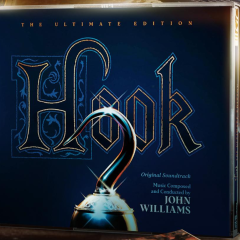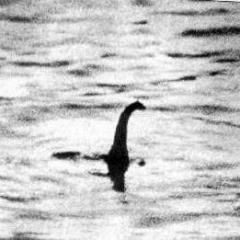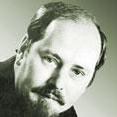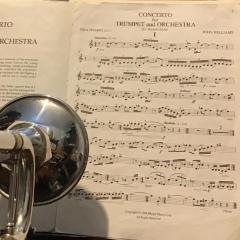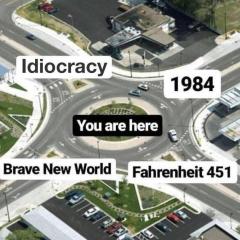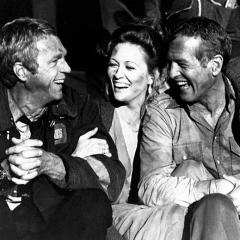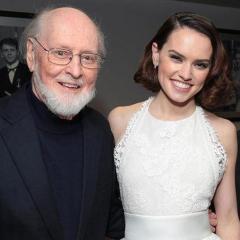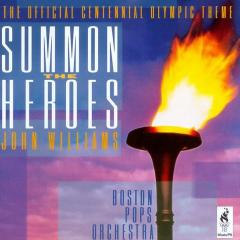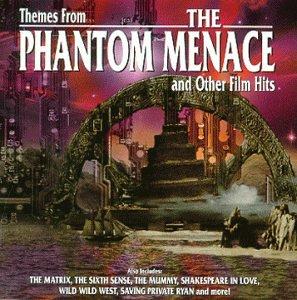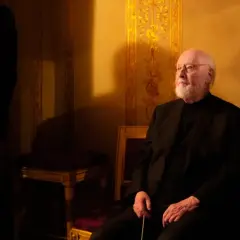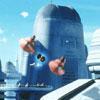Leaderboard
Popular Content
Showing content with the highest reputation on 21/08/21 in Posts
-

The John Williams Concert Work Listening and Discussion Thread
Raiders of the SoundtrArk and 2 others reacted to SteveMc for a topic
Clarinet Concerto (1991) Written for LA Philharmonic clarinet principal Michele Zukovsky, John Williams's Clarinet Concerto marks what I find a starting point of a rather consistent string of concerti by the composer. Prior to this, he had written only three in three decades. From this point onwards Williams would express himself regularly in the medium. Of all these concerti from what I call the "Reflective" period onwards, the Clarinet Concerto may just be the most obscure. It has never received a fully proper recording/release to my knowledge. The release that is available is a live recording of questionable (read: pretty bad) quality. Zukovsky seems to have exclusive rights to the piece, but on a woodwind board it is noted that the piece's obscurity has less to do with her and more to do with Williams being strongly (though perhaps recently less strongly) unsatisfied with the work and wishing it remain in the shadows, so to speak. It has not been published in score form either, though some sheets may be out there. A clarinetist on the aforementioned board claims to have studied it and noted that it is a very difficult piece for the soloist. The work is in three movements and is perhaps one of the more tonal and filmic of Williams's concerti, though still with the modernist bent that characterizes most of them. The first movement, Maestoso or Aria, has the sort of expected JW opening concerto movement structure, with distinct opening, buildup towards a climax, and then cadenza and quiet coda. The opening is characterized by a measured dissonance, the most modern sounding material in the piece, which soon leads to lyrical thematic material. This is followed by some lively passages that offer some wonderful interplay between soloist and orchestra. The climax marks a return of the lyrical material, followed by more of the interplay that dissolves into the engaging cadenza and concluding coda. The second movement Calmo or Elegy is a strongly structured delicate part that really is quite beautiful, lackluster recording notwithstanding. It begins with a nocturnal type episode with touches of mystery and longing. The second episode is more broadly lyrical, though still with some uncertainty of feeling that comes to the fore in some quicker virtuosic passages Then, a solo horn arrives and the mood turns nocturnal again, anticipating the Horn Concerto. Tension builds, and the strings herald a new more dissonant episode. The piece concludes with a return to the more lyrical mood, this time with a certain urgency. The third movement, Con Brio or Burlesque is broad fun. The most filmic movement, it calls to mind the strains of adventure and motion in Williams's action and scherzo writing for his scores. The tone is often cheeky and the writing for soloist virtuosic. The orchestra, especially the brass, get a chance to shine as well. This movement has the potential to be a real crowd pleaser. It is thematic and full of vibrant interplay. It sounds a lot like what a lot of folks want John's concert music to sound like. The rest of the work comes pretty close to that. I do hope this piece gets out of the shadows. I think it can quite readily enter the repertoire both as a challenge for soloist and as a drawer of crowds when it is on the program. Here is a link to purchase in the best (admittedly still quite lacking) quality we seem to have of the piece. The version on Spotify is unlistenable, imo. https://www.amazon.com/Williams-Clarinet-Concerto-Michele-Zukovsky/dp/B004HQTBIK/ref=sr_1_2?dchild=1&keywords=clarinet+concerto+williams&qid=1629524264&sr=8-23 points -
Some more Adams...2 points
-
Also unreleased: The Darkest Day is similar in that some of the choir is dialed out in the film (rather, it's dialed in for the shot of the destroyer over New York reaching so far it fades into the horizon) The cue Alien Ship Powers Up is cut in half in the film, its opening replaced with a section of the End Titles, but what's intact ("you really think you can do all that bullshit you just said?") is a version without the choir. There are two versions of the cue Rescue (on the LLL as Target Remains / Rescue, it's the softer music for David / Connie and then Hiller taking the chopper to fly away), one where the ending string rhythm that leads to the closing brass fanfare, is muddled a bit in the performance. One of the boots, can't recall which, has the cleaner performance. There's also a cue of a basic snare drum pattern for when Hiller arrives at Area 51 with the alien, exciting Dr. Soong...I mean Dr. Okun, and the one thing I wish the LLL had, which was the pounding snare drums that open the cue Victory (titled 'Independence Day' on the various boots) It's my favorite film score, and the one that made me a fan of film music's magic.2 points
-
Chris is still working on it. I’m definitely thinking about getting this one. And maybe the next one too…and the next one…2 points
-
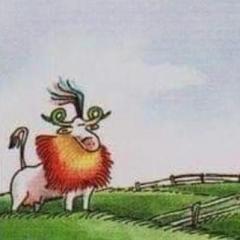
FILM: A.I. Artificial Intelligence (dir. Steven Spielberg)
Indianagirl reacted to The Illustrious Jerry for a topic
A.I. Artificial Intelligence (2001) "I'm sorry I didn't tell you about the world." I've always felt there was an important piece missing from my understanding of Spielberg's filmography. I could never quite figure out what it was, and I certainly didn't expect the answer to come from a film that had already been made. While there remains a handful of holes in my viewing of his work (A.I. being one of them for the longest time), I had long thought it likely that this void might only ever be filled by a new Spielberg project, a coda that had the opportunity to convey something truly and deeply retrospective (The Fablemans perhaps?). Nonetheless, I now realize that this unexplained absence I had once felt was merely an oversight on my part, and has been wholly remedied by what is surely one of the most reflective and rewarding films of Spielberg's career. While many will revisit what may be one of our greatest director's most misunderstood films for its 20th anniversary this year, this was a first time viewing for me. It's hard to articulate the impact inherent in the nature of the material, so I will avoid diving too far into the many philosophical questions the film raises, but the endlessly captivating presentation is perhaps the single finest delivery that one could hope for. Spielberg, Williams, and Kaminski manage to communicate such immensely rich and complicated concepts in perfect synthesis, achieving a pure combination of music and images to create what some have described as "a glimpse into eternity" (such a phrase may read as cheesy hyperbole, but I doubt it has ever been more true). As always, John Williams' contribution is nothing short of masterful. In many ways, A.I. is one of his finest works; a tone poem worthy of the concert hall. Williams' instrumentation is particularly dynamic, with piano, cor anglais, and wordless choir all playing vital roles that stand above comparison in his vast body of work. I'm not skilled enough to wax lyrical about the countless masterstrokes present throughout this score, although I would very much like to be able to. I will say, however, that Abandoned in the Woods is my personal favourite cue, as it splendidly accentuates a heartbreaking scene with equal parts tension and emotion. The way Williams' develops his leitmotifs really lends well to scoring moments such as this, as there is a remarkably effective sincerity to the emphasis his music provides that ultimately marks the argument of manipulation as void. His ability to develop thematic material in this manner has never been more subtle, and yet all of the power that would be expected in a more overt approach is completely retained, if not multiplied, as this fascinating catalogue of motifs weaves together to form one of Williams' greatest tapestries. Janusz Kaminski gets a lot of flack for his work in the early 2000s, with an aesthetic typically defined by bright white lighting and intense bloom. With A.I., however, there's a clear and consistent visual purpose to nearly every scene, solidifying it as a definitive high for Spielberg's longtime cinematographer. DPs and directors can go their whole career without ever coming close to the superb symbolism constantly on display here. For example, the image of David's confused and estranged face framed through the empty eye of his replica (see top left); the same manufactured shell, yet seen through an entirely different set of eyes. Further emphasis on David's multiplicity is made apparent by another striking shot (see top right), with the camera constantly refuting his hopes for human individuality by repeatedly reinforcing that he is still one of many. A dinner scene offers yet another vivid image to dissect (see bottom left): a halo over David echoes the manufacturer's marketing of the boy as "the perfect child", yet it is the same thing that separates him from his adoptive parents in the shot. The depth of these stills alone is unmatched. The lonely and isolated image of David abandoned in the woods (see bottom right) is a lasting one, and it is important to note that it is seen not through the eyes of Monica, but through the soulless reflection of the car's side mirror. There is no other perspective to turn to, as Monica cannot bring herself to look back. I do not possess the ability to unpack in mere words the philosophical wellspring that is so crucial to this wondrously provocative narrative, and while there are certainly several equally valid interpretations to be compared and analyzed, the film ultimately requires a more independent and personal understanding. Nonetheless, there's no doubt in my mind that the efforts of all involved combine to create a truly astounding and transcendent experience. I look forward to seeing how my relationship with this film changes as I grow older, as I'm certain new nuances will come to the fore with age. "Make a wish." "It came true already." P.S. I wrote about this film two months ago and for whatever reason I never posted about it here. Better late than never I suppose.1 point -
With the 2 months it took to get the credits fixed, maybe someone went back and double checked.1 point
-
1 point
-
I was just going to PM you regarding those. THANK YOU!1 point
-

Hook - 30th Anniversary Double Vinyl from Mondo Records 2021
Manakin Skywalker reacted to crumbs for a topic
Wow, impressive! It sounds so much better than the film stems LLL used back in 2011... albeit those were for other cues. Any chance of getting clean film inserts for Ultimate War, or Cornucopia, from the Atmos track?1 point -

Hook - 30th Anniversary Double Vinyl from Mondo Records 2021
crumbs reacted to Manakin Skywalker for a topic
That's my video, I ripped it straight from the Atmos track. I'll be uploading the isolated percussion sans orchestra in a separate video later today.1 point -
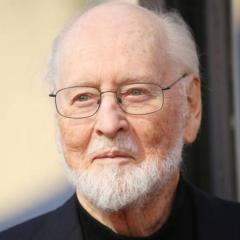
Hook - 30th Anniversary Double Vinyl from Mondo Records 2021
Manakin Skywalker reacted to JohnnyD for a topic
Actually, that is the actual percussion insert as heard in the film; it is just blended with the original version.1 point -

The John Williams Concert Work Listening and Discussion Thread
SteveMc reacted to Miguel Andrade for a topic
The piece was performed but a few times, in LA and later at Tanglewood. While the recorded version is credited to the Bohemian Orchestra, I wouldn't be surprised if this was a recording of WGBH broadcast of the Tanglewood performance. Titles of the movements on the CD/mp3 release do no match the ones on the Tanglewood program book, by the way. The producer of this poorly (to put it nicely) sounding recording did post on this boards ages ago, when this first surfaced, and was very protective of his release. There was also a Clarinet and Piano reduction of the final movement available on iTunes.1 point -
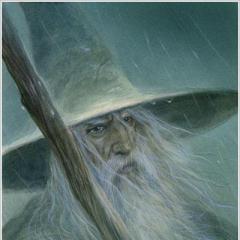
The Official Intrada Thread
Yavar Moradi reacted to Incanus for a topic
That is a great re-recording. Introduced me to Miklós Rózsa and made me a fan. Nice to see it back in print.1 point -
1 point
-

What Is The Last Score You Listened To? (older scores)
Raiders of the SoundtrArk reacted to Smaug The Iron for a topic
Batman by Danny Elfman (La La Land Records) Batman Returns by Danny Elfman (La La Land Records) Far And Away by John Williams (La La Land Records) Saving Private Ryan by John Williams (La La Land Records) A.I. Artificial Intelligence by John Williams (La La Land Records misprinted)1 point -
Nixon is just awesome. The trailer music just works every time for me. As some of you know, I teach high school US history, and for a CNN documentary on the JFK / Nixon election we watch in class I overlapped Nixon and JFK music all throughout the documentary, especially the Turbulent Years track and Miami Convention track (come on, that ending!)1 point
-
This thread brings back memories. I believe this was released the day I met John Williams. A very good day.1 point
-
This is fantastic! I’d go nuts if we ever got Tomorrow Never Dies1 point
-
Woah! I never noticed either of those things! Thanks for bumping this thread, reminded me how much I freaking love this score...1 point
-
Sorry if these couple things have been discussed already, I couldn't find it if it has been.... I've been slowly watching the film and listening to the LLL release, and looking along at @Jay's fun spreadsheet. A Couple details I have noticed: There are 3 endings to 7M2 Base Attack / Dogfight; The assumed Original version, with one long sustained major chord. LLL Disc 1, Track 12b (as well as the OST, and the World Records Bootleg) An alternate version, which has the dun-dundundun-duunnnnn (quarter note, quarter note triplet, whole note) rhythm, but the instruments playing the rhythm are split into a major chord. Only available on the "Other Boot", track 15 Base Attack - Dogfight. The 3rd version, the film version, which has the rhythm mentioned above, but the instruments playing the rhythm are playing the tonic of the chord, in octaves, rather than forming a chord. Only on LLL Disc 2, Track 12, and heard in the film. This is also the ending on the Live-to-Picture performances (as it should be, since it's the film version). In the film, 8M3 The Big Tamale first plays almost entirely without choir, then segues into somewhere around 0:11 of the same cue but with choir this time and plays to the end. Film edit: 8M3 The Big Tamale (no choir) 0:00-0:18 / 8M3 The Big Tamale 0:11-END This means there's a 'no choir' version of 8M3 which remains unreleased, but which can mostly be heard in the film.1 point
-
I guess that means there's (•_•) ( •_•)>⌐■-■ (⌐■_■) No Time To Delay1 point
-
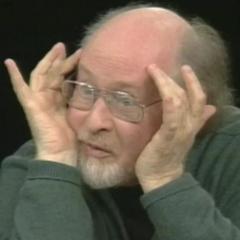
Your favorite John Williams pictures
Darth Mulder reacted to Thor for a topic
Good question. I can't remember having seen any. Maybe some have. I don't believe Eastwood was in the audience when Morricone received his Oscar for THE HATEFUL EIGHT (but Williams was). But he introduced him for the honorary award earlier (but I don't know if Williams was in the audience then).1 point -
The ones Williams will do with the LSO for a definitive 3-cd set. I am trying to have my people talk to his people to make this happen, but, as it turns out, I don't have any people.1 point
-
I have noticed that the Main Title Theme from the CBS-TV Network Show, "Gunslinger", is missing in the JW discography. This song as well as "Wanted Man" were performed by Frankie Laine, conducted by Johnny Williams and released as single in 1961. So, I have just added it. Artist: Frankie Laine Songs: "Gunslinger", "Wanted Man" Orchestra & Chorus conducted by Johnny Williams; Columbia No. 4-41974; Recorded 16 December 1960 & 3 February 1961; Released 20 March, 19611 point
-
Hook - 30th Anniversary Double Vinyl from Mondo Records 2021
Miguel Andrade reacted to TownerFan for a topic
There are no quotes from JW about the film itself anywhere, but here's an interesting thing he said to Richard Dyer in 1991 that somehow relates to elements of the film that spoke to himself:1 point -

The NINTENDO Thread
Docteur Qui reacted to SilverTrumpet for a topic
Pokemon is creatively (and technically) dead. I was surprised I saw so many people so gaga over this overview when people were so negative during the first reveal.1 point -
I'd say his last true masterpiece is Philosopher's Stone, and before that Schindler's List. The former is the absolute zenith of the fantasy/adventure/magic writing that began with Star Wars and percolated throughout the 80s and early 90s and his most iconic scores. He was clearly more inspired than he'd been since Hook, and it shows in the music. Schindler's List speaks for itself. It's raw emotion, pain, horror and hope distilled into a surprisingly cohesive sound. I'm generally lukewarm (but respectful) towards JW's drama scores, his post 2000 ones are excellent in the film but not too interesting to listen to outside, while SL is that perfect beast of both worlds. I don't like to bandy around the word masterpiece as, for me, it implies the absolute cream-of-the-crop of an artist's output. No composer in my opinion has more than a handful of true masterpieces, which is the point (it's all relative in the end). Scores like PoA and TPM are absolutely remarkable and even more enjoyable to listen to than the above two, but in terms of my perception of the emotional labour involved and the corresponding quality of output, these two are the obvious choice.1 point
-
Your favorite John Williams pictures
BB-8 reacted to Marian Schedenig for a topic
…and there the resemblance ceases.1 point -
Studying music composition.1 point

